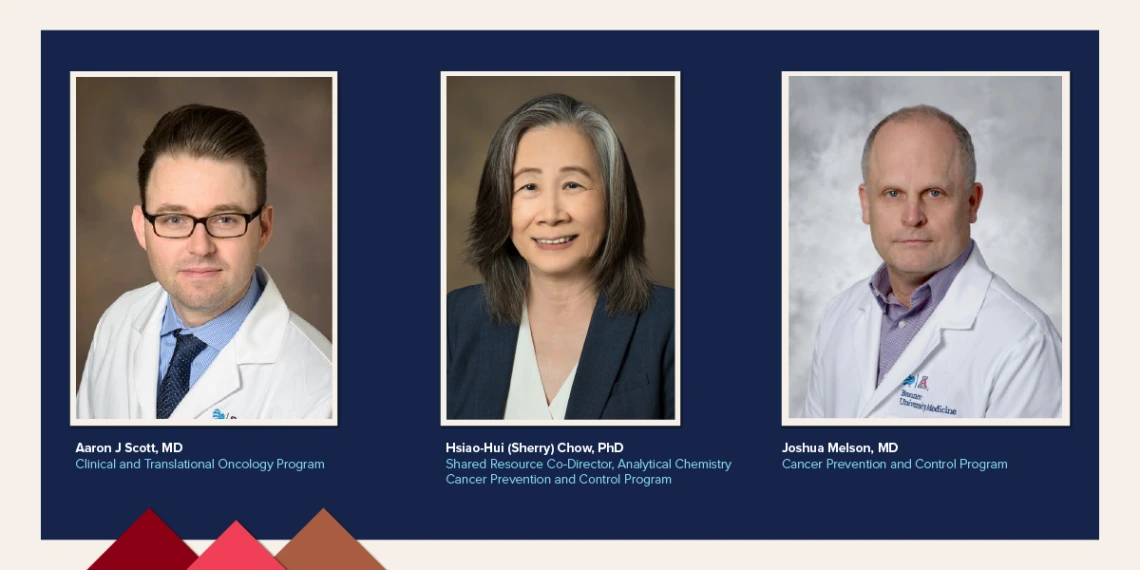Cancer researchers test preventive vaccine for people with Lynch Syndrome
Potential results could improve lives of people with this hereditary colon cancer syndrome

More than 1.2 million people in the U.S. have an increased risk of developing colon and other cancers due to an inherited genetic disorder, hereditary non-polyposis colorectal cancer, or Lynch syndrome.
Today, a collaborative team of researchers is testing if a vaccination could prevent people with Lynch syndrome from developing colon polyps or tumors. University of Arizona Cancer Center members Aaron Scott, MD, and Hsiao-Hui (Sherry) Chow, PhD, are partnering with investigators from 14 university cancer centers and clinics across the U.S to conduct a study testing a combination of vaccines for cancer prevention in Lynch Syndrome.
The Arizona investigators are also working with Joshua Melson, MD, a clinical professor in the University Department of Medicine and Cancer Center member in the Cancer Prevention and Control Program.
“Dr. Melson is an expert in high-risk genetics and colon cancer,” said Scott, associate professor in the University Department of Medicine and co-lead of the Cancer Center Clinical and Translational Oncology Program. “He has been a fantastic addition. He offers expertise and passion and a positive outlook for our Lynch Syndrome patients.”
According to Chow, research professor in the University Department of Medicine and the contact principal investigator of the University of Arizona Cancer Prevention Clinical Trials Network, or UA CP-CTNet, Lynch Syndrome is the most common hereditary colon cancer syndrome.
“The lifetime risk of colon cancer in patients with LS can be as high as 80% compared to 5% in the general population,” Chow said. “Removal of pre-cancers by colonoscopy can reduce the cancer risk in the general population, but surveillance colonoscopy is less effective among LS patients due to the accelerated cancer growth and the high miss rate of LS-specific flat adenomas.”
Lynch Syndrome is also linked to increased risk of other cancers such as endometrial, ovarian, urinary tract, gastric, and others. Therefore, systemic approaches for cancer prevention in Lynch Syndrome patients are desperately needed.
“Prevention with vaccines is a highly attractive approach because they potentially target transformed cells and could provide life-long protection,” Chow said. “Well-designed vaccines can train the body's own immune system to eliminate transformed cells at the pre-cancerous stage.”
According to Chow, the Lynch Syndrome trial is one of the highest priority trials sponsored by the National Cancer Institute, Division of Cancer Prevention. The trial is funded through the Cancer Prevention Clinical Trials Network, or CP-CTNet. CP-CTNet is a major program funded by the National Cancer Institute, Division of Cancer Prevention to design and conduct early phase cancer prevention clinical trials.
Chow said that the UACC has a long and highly successful track record in designing and conducting early phase cancer prevention clinical trials, and that UA CP-CTNet is one of the only five NCI-funded programs under this mechanism.
According to Scott, Lynch Syndrome study researchers are testing a preventive vaccine series that uses a combination of three vaccines, called Tri-Ad5, combined with a protein, N-803, that boost the body’s own immune system to prevent polyps and cancers.
Through the study, they hope to compare the safety and effects of the Tri-Ad5 vaccines alone or in combination with N803 versus placebo on the risk of developing colon and other cancers in patients with Lynch Syndrome. The vaccines are not yet approved by the FDA.
Though the trial has already started, the team is still looking for approximately 15 people to participate in the study.
According to Melson, since Lynch Syndrome patients are at an increased risk for cancer in multiple organs, this intervention study offers a potential way to prevent cancer development in those multiple susceptible organs.
“The hope is that the trial leads to a better understanding of ways to prevent cancer development so Lynch Syndrome patients are more likely to live longer with better quality of life,” Melson said.
Scott said the study through the CP-CTNet is an excellent example of the importance of having a strong collaboration through the NCI.
“One of the best parts about my job that makes me feel very encouraged about where the future lies in the collaborative nature of cancer research,” Scott said. “The CP-CTNet and the leadership that is running it is very sound. It is inspiring to be a part of a group like this.”
For more information or to enroll in the trial, contact Aaron Scott at ajscott@arizona.edu.



